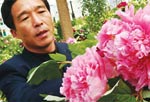Tips and Articles
Secret garden
Updated: 2011-03-10 07:55
By Wu Yiyao (China Daily)
 |
"Nong-hao (Hello)," says 27-year-old Chen Jianming, greeting a young woman.
"Nong-hao," replies 25-year-old Lu Xia, trying not to laugh at her imitation of the Shanghai dialect.
"Qin-tsai-ji-di?" Chen asks, inquiring about the price of cabbage, before bursting into laughter.
At the birthplace of renowned writer Eileen Chang (1920-95, aka Zhang Ailing), visitors can have a go at the Shanghai dialect through role-play, in scenes adopted from everyday life.
As Shanghai attracts millions of newcomers, getting the tongue accustomed to the rapid-fire local dialect helps one integrate faster into this city.
Given the lack of textbooks to guide one through the standard Shanghai dialect, eager learners may find Chang's novels to be a good source, as many of her works are set in the narrow lanes of her birthplace.
At a residents' recreational center in Jing'an district, some elderly folk practice tai chi, while the kids learn how to sketch.
It's hard to tell that this place once witnessed the birth and early life of the famous writer, whose personal life was marred by disappointment, tragedy and betrayals.
The garden at today's East Kangding Road belonged to Li Hongzhang, an influential minister of the late Qing Dynasty (1644-1911). When Li arranged the betrothal of his daughter to Zhang Peilun, Eileen Chang's grandfather, the garden became part of the dowry, and this is where Chang and her younger brother grew up.
When Chang was born, she was named Zhang Ying, meaning a beautiful piece of jade. It is in this garden that she adopted the name Ailing when she was 10. Ailing comes from Eileen, a name given by her mother as she entered an English school.
Scholars say Chang's childhood impacted her descriptions of Shanghai life and her autobiographical works. She recalls the good old days when she rode a bicycle, a rarity in those times, together with her younger brother.
But the garden is not always linked with nice memories. Her father took a concubine who locked Chang in a dark, damp room. Both her father and the concubine were addicted to opium and Chang's mother eventually divorced her father. Her miserable childhood is reflected in the pessimistic tone of her later works.
Chang's family later moved out of the garden as wars broke out, leaving few people with knowledge of its link with Chang. The garden passed between various owners and even served as a supermarket and a polytechnic college. In 2008, people finally recognized it as the renowned writer's birthplace.
There are few Chinese women who have retained people's interest long after their own time. Chang is one of them. In 2007, the award-winning film Lust, Caution, which was adopted from one of her novels, further promoted interest in the writer.
In 2009, or 14 years after her death, her novel Small Reunion (Xiao Tuanuuan) shot to the top of the best-selling fiction list.
Chang's semi-autobiographical novels, The Fall of the Pagoda and The Book of Changes, were published in 2010.
With her birthplace being thrown open once again, Chang's fans can relive moments of her early life and works, for free. The garden also hosts short weekly programs for its neighborhood residents.
E-paper

Rise and shine
The Chinese solar energy industry is heating up following recent setbacks in the nuclear sector
Bombs aim for regime change
CSI, with a twist
Literary path
Specials

Peony express
Growers of china's unofficial national flower are reaching out to europe for help

Tea-ing up
More turning to Chinese tea for investment opportunities like vintage wine

A cut above
The ancient city of Luoyang is home to a treasure trove of cultural wonders.
